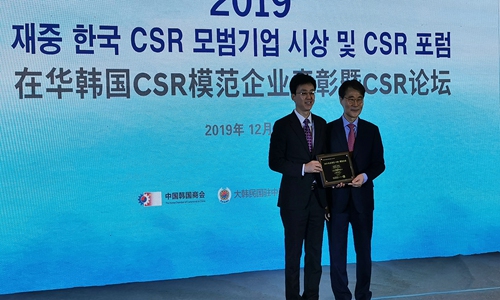HOME >> SOURCE
China remains top target for South Korean companies: authority
By Yin Yeping Source:Global Times Published: 2019/12/12 20:53:43

South Korean Ambassador to China Jang Ha-sung (right) presents award to a representative of Samsung at an annual CSR event in Beijing on Thursday. Photo: Yin Yeping/GT
China is still the first choice for South Korean companies in investment and, despite Samsung's recent removal of its smartphone production out of China, South Korean authorities said.Samsung closed its last smartphone factory in China in October and moved to Vietnam, raising doubts about whether China is losing its attraction to investors from the neighboring country.
Such concerns were eased as Samsung started its second phase of its investment project on memory chips and encapsulation in Xi'an, Shaanxi Province on Tuesday.
Including the first phase that Samsung launched in Xi'an in 2012, the total investment of the project has reached $25.8 billion, which is the largest semiconductor factory in the world.
Despite the ongoing China-US trade war and the slowdown of GDP growth, China remains the largest and the most attractive market to South Korean companies.
Jang Ha-sung, the South Korean Ambassador to China, told the Global Times on Thursday that South Korean companies have now transformed their business focus in China as the country's economic level and technology capability is growing.
"South Korean companies came to China for cheap labor, but that was in the past. Now they are changing their focus into high-technology cooperation and high value-added services in China," Jang said.
In addition to Samsung, other South Korean companies are also expanding their cooperation in the Chinese market.
South Korea's LG Display put into operation a facility to make organic light emitting diodes (OLEDs) in Guangzhou, South China's Guangdong Province, on August 29, with total investment of 46 billion yuan ($6.54 billion). The factory's monthly production capacity is about 90,000 glass substrates, according to LG's official report.
The report said that since LG Display built its modeling group factory in 2006 and LCD factory in 2012, the company has built one new factory in Guangzhou every six years on average.
According to statistics from China's Ministry of Commerce concerning foreign-invested enterprise, from January to October 2019, South Korea ranked second only to Singapore among the top 10 countries investing in China. South Korea's total investment was $5.04 billion, up 20 percent compared with the same period in 2018.
Chung Chang-hwa, head of the Korea Chamber of Commerce in China, told the Global Times on Thursday that he is confident about the Chinese economy despite the decline of GDP growth.
"Even if China's GDP growth slowed to 6 percent or even lower next year, China's economic growth remains the highest among major global economies, and I have no questions or concerns about that," Chung said.
Shin Jae-min, head of the CSR department of Hyundai Motor Group (China), told the Global Times on Thursday that China is the company's most important market and it is expanding its efforts in promoting new-energy vehicles in China.
“Despite the volatility in sales, our commitment to CSR in China will continue,"Shin said.
RELATED ARTICLES:
Posted in: ECONOMY